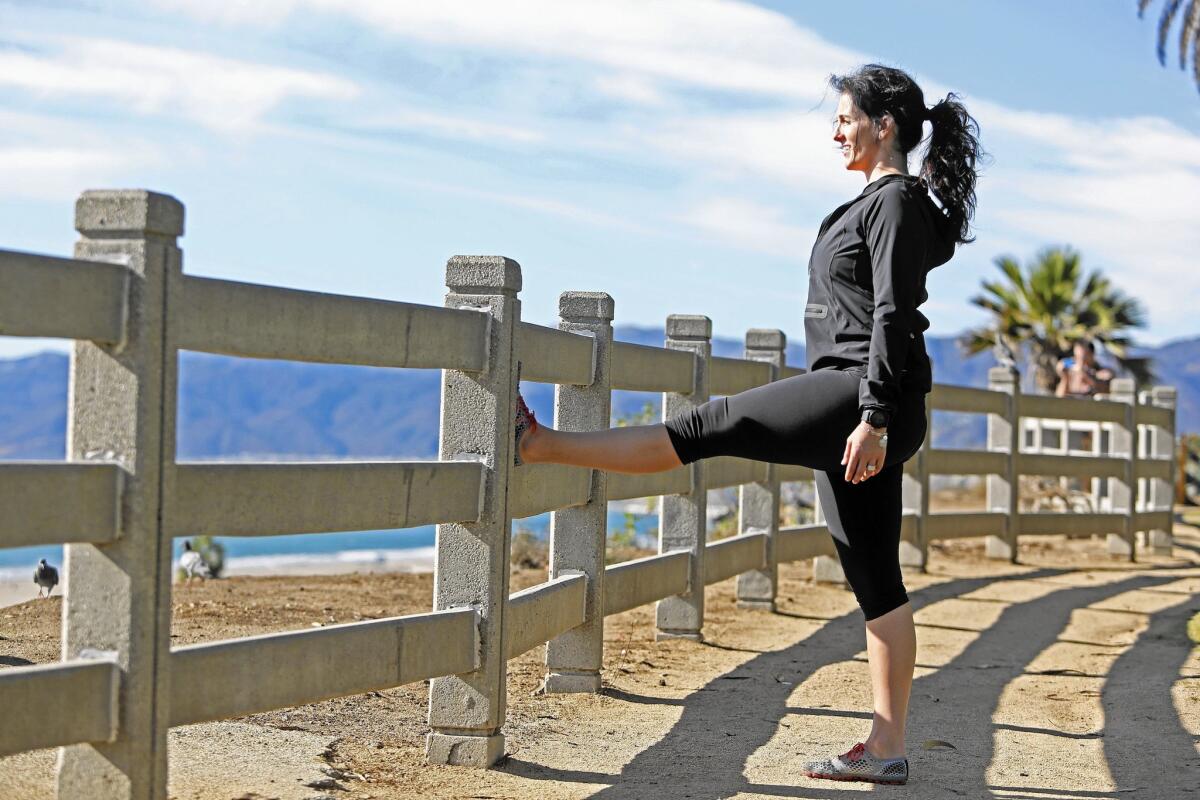The great outdoors can put a spring in your workout

Sometimes you don’t feel like going to the gym. You’re just not in the mood for the same old climate-controlled scene, bad music, boring equipment. Besides, on a beautiful Southern California day, why be stuck indoors with a bunch of bicycles to nowhere?
But that’s no reason to forgo fitness. Just step outside. You can skip the gym and get the same — or better — benefits, experts say.
A walk in the park
“When you exercise in nature, your mind and body must negotiate elevation gradients and surface textures — grass, sand, stones and tree roots,” says Amanda Joyce, a West Los Angeles certified personal trainer. “These enhance body awareness, balance, reaction reflexes and neuromuscular coordination.”
Besides, outdoor frolicking is fun. “Keep it playful,” Joyce says. “Hop, skip, jump and swing from monkey bars. The change in scenery is enough to help us switch gears, lift our spirits and put a skip in our step.”
Multiple studies confirm that outdoor physical activity enhances moods and boosts energy, according to a 2011 review published in the journal Environmental Science and Technology. What’s more, the researchers found, people who exercise in nature are more likely to want to continue.
“I use the elements: rocks for swings and pressing movements, tree branches for pull-ups, sand for added resistance,” says certified personal trainer Jason Baker, co-founder of Sweat Outdoors, a group workout program held in Santa Barbara parks. “You can do tons of exercises on a park bench — step-ups, squats, lunges and push-ups.” (To see a step-by-step outdoor workout combining cardio and strength-training, go to SweatOutdoors.com and download a podcast.)
And of course there’s always hiking and bicycling. Want more cardio? Go faster or tackle hills.
Pack your bag
If you want to replicate your circuit routine from the gym — or if swinging from monkey bars isn’t your thing — put together a portable exercise kit, says certified personal trainer Melanie Webb. “I have a little backpack with my workout toys. It’s a great workout-in-a-bag.” Her backpack holds lightweight, easy-to-tote resistance bands and TRX straps for strength training and a jump rope for cardio.
“I keep a stash of granola bars, so I’m not in danger of going home to grab something to eat and not making it out to exercise,” says Webb, who recently moved her company, Sol Fitness Adventures, to Deer Valley, Utah. She is launching a specialty certification program called Mother Nature’s Gym to teach fitness pros how to combine traditional training techniques with outdoor activities.
A yoga mat or large beach towel will come in handy “when you need a flat, comfortable area and during positions where you’ll be on your hands or knees and need a little cushion,” says West Hollywood personal trainer Michael Clancy (RunyonStrong.com). The recently relocated New Yorker led twice-weekly “Work Out in the Park” group sessions in Central Park and plans a similar series in Los Angeles.
Toss in a couple of towels and hand wipes because “sweating and dirt happen when you exercise outdoors,” Clancy says. Don’t forget water — you can’t count on a fountain being available. And sunscreen is always a must.
Where to go
The great thing about non-gym exercise is that you can always find a place to work out. Is a high school or college football field nearby? Jog the track and walk (or run) up the stairs. Staying at a hotel? The concierge or front desk can provide a walking map with a route clearly marked so you’ll know where and how far you’re going, with no risk of ending up somewhere you don’t want to be.
“Through social media, you can find hiking clubs, MeetUps, local running clubs, or fitness events,” Clancy says.
Got a sec?
Small bursts of normal daily activity — even one- or two-minute increments, when added up — can be as beneficial as a gym workout, according to a 2013 study from Oregon State University. In fact, non-gym-goers who built small bouts of activity into their normal lives were more likely to get more physical activity than dedicated gym-goers who followed a structured exercise regime, the researchers found.
Seek ways to incorporate movement into daily life. Rake leaves instead of using a blower; bike for short errands instead of jumping in the car; walk around during your child’s sporting event.
“Forget all-or-nothing thinking,” Webb says. “A 10-minute walk on your lunch hour will rejuvenate you.”
Brief episodes of intense activity add up to make a positive health difference and lower the risk of obesity, according to a 2013 University of Utah study of about 5,000 people. (Intense activity was defined as the exertion required to walk about three miles per hour.)
“You can always find time to crank out a few squats or lunges on a bench, hold a plank for a minute or two, or find a stairwell to walk steps,” Baker says. “Those little everyday choices, compounded over time, make the difference.”






